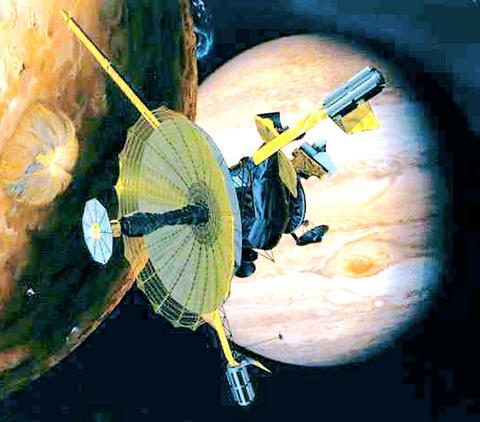Something strange is tugging at America's oldest spacecraft. As the Pioneer 10 and Pioneer 11 probes head towards distant stars, scientists have discovered that the craft -- launched more than 30 years ago -- appear to be in the grip of a mysterious force that is holding them back as they sweep out of the solar system.
Some researchers say unseen "dark matter" may permeate the universe and that this is affecting the Pioneers' passage. Others say flaws in our understanding of the laws of gravity best explain the crafts' wayward behavior.

GRAPHIC: NY TIMES
As a result, scientists are to press a European Space Agency (Esa) meeting, called Cosmic Visions, in Paris this week for backing for a mission that would follow the Pioneers and pinpoint the cause of their erratic movements.
The strange behaviour of the Pioneers -- which swept by Jupiter and Saturn in the 1980's -- was discovered by John Anderson and Slava Turyshev of the Jet Propulsion Laboratory in Pasadena and Michael Martin Neito of the Los Alamos National Laboratory.
They had been tracking the probes using the giant dishes of NASA's Deep Space Network. By the time the two spaceships had swept beyond Pluto, they noted there were persistent anomalies in their trajectories.
Every time they looked the Pioneers were in the wrong place. The effect was not large, but it was significant to draw the attention of the scientists. The two agreed that something more than the Sun's gravity appeared to have a grip on the craft.
The reasons for the anomaly have caused a rift among physicists, however. Some believe the effect may simply be flaws with the probes. Gas from fuel tanks may be leaking from them, slowing their passages, say some astronomers. "Unless there is really good evidence to the contrary, we should stick to simple ideas like these and not go around blaming strange new types of particle or flaws in general relativity," said Professor Martin Barstow, of Leicester University.
But this view has been rejected by Anderson. "It's hard to imagine such a leak happening on both probes at the same time in such a way as to produce an identical acceleration," he said.
And most scientists back him. "The effect is real," said Bernard Haisch of the California Institute for Physics and Astrophysics.
One proposal put forward is that Newton's idea that the force of gravity weakens as distance increases may be incorrect over very large spaces, and may drop off over very long distances.
"It is time to settle the Pioneer issue with a new deep-space mission that will test for, and decide on, the anomaly," Anderson, Turyshev and Nieto state in Physics World.
By fitting a Pioneer follow-up probe with new measuring equipment, navigational device and communications gear, it should be possible to discover if the probes are in the grip of a new force of nature.

The People’s Republic of China (PRC) last week offered us a glimpse of the violence it plans against Taiwan, with two days of blockade drills conducted around the nation and live-fire exercises not far away in the East China Sea. The PRC said it had practiced hitting “simulated targets of key ports and energy facilities.” Taiwan confirmed on Thursday that PRC Coast Guard ships were directed by the its Eastern Theater Command, meaning that they are assumed to be military assets in a confrontation. Because of this, the number of assets available to the PRC navy is far, far bigger

The 1990s were a turbulent time for the Chinese Nationalist Party’s (KMT) patronage factions. For a look at how they formed, check out the March 2 “Deep Dives.” In the boom years of the 1980s and 1990s the factions amassed fortunes from corruption, access to the levers of local government and prime access to property. They also moved into industries like construction and the gravel business, devastating river ecosystems while the governments they controlled looked the other way. By this period, the factions had largely carved out geographical feifdoms in the local jurisdictions the national KMT restrained them to. For example,

The remains of this Japanese-era trail designed to protect the camphor industry make for a scenic day-hike, a fascinating overnight hike or a challenging multi-day adventure Maolin District (茂林) in Kaohsiung is well known for beautiful roadside scenery, waterfalls, the annual butterfly migration and indigenous culture. A lesser known but worthwhile destination here lies along the very top of the valley: the Liugui Security Path (六龜警備道). This relic of the Japanese era once isolated the Maolin valley from the outside world but now serves to draw tourists in. The path originally ran for about 50km, but not all of this trail is still easily walkable. The nicest section for a simple day hike is the heavily trafficked southern section above Maolin and Wanshan (萬山) villages. Remains of

Shunxian Temple (順賢宮) is luxurious. Massive, exquisitely ornamented, in pristine condition and yet varnished by the passing of time. General manager Huang Wen-jeng (黃文正) points to a ceiling in a little anteroom: a splendid painting of a tiger stares at us from above. Wherever you walk, his eyes seem riveted on you. “When you pray or when you tribute money, he is still there, looking at you,” he says. But the tiger isn’t threatening — indeed, it’s there to protect locals. Not that they may need it because Neimen District (內門) in Kaohsiung has a martial tradition dating back centuries. On